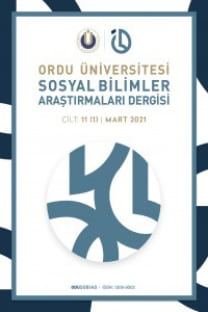Investigation of Solid Waste Collectors with Economic and Social Dimensions
Katı atık, katı atık toplayıcıları, toplumsal değişme, göç, yoksulluk, dezavantajlılık, geridönüşüm
Investigation of Solid Waste Collectors with Economic and Social Dimensions
Solid waste, solid waste collectors, social change, migration, poverty, disadvantage, recycling,
___
- AGED (2021). Sokak toplayıcıları sosyo-ekonomik araştırma raporu. https://aged.org.tr/raporlar/AGED_sokak_toplayicilari_raporu.pdf
- Akkan B. D., Deniz M. B. ve Ertan M. (2016). Yoksulluk ve sosyal dışlanmanın romanlaşması. B. Altuntaş (Der.). Dezavantajlı Gruplar ve Sosyal Politika içinde (ss. 115-136), Ankara: Nobel Yayınları.
- Balbay, Ş., Sarıhan, A., ve Avşar, E. (2021). Dünyada ve Türkiye’de “döngüsel ekonomi / endüstriyel sürdürülebilirlik” yaklaşımı, Avrupa Bilim ve Teknoloji Dergisi, 27, 557-569. https://doi.org/10.31590/ejosat.971172
- Braun, V., & Clarke, V. (2006). Using thematic analysis in psychology. Qualitative Research in Psychology, 3(2), 77–101. http://dx.doi.org/10.1191/1478088706qp063oa
- Bunn, T. L., Slavova, S., & Tang, M. (2011). Injuries among solid waste collectors in private versus public sectors. Waste Manag Res. 29(10), 1043-1052. https://doi.org/10.1177/0734242X11410115
- Yang, C. Y., Chang, W. T., Chuang, H, Y., Tsai, S. S., Wu, T. N., & Sung, F. C. (2001). Adverse health effects among household waste collectors in Taiwan, Environmental Research, 85(3), 195-9. https://doi.org/10.1006/enrs.2000.4235
- Campbell, S. (2018). Migrant waste collectors in Thailand's ınformal economy: mapping class relations, European Journal of East Asian Studies, 17(2). 263-288. https://doi.org/10.1163/15700615-01702003
- ISSN: 1309-9302
- Yayın Aralığı: 4
- Başlangıç: 2010
- Yayıncı: -
Otizmli Çocuklar İçin Giysi Modifikasyon Uygulamaları Kılavuzu
Saliha USLU TANDOĞAN, Neşe ÇEĞİNDİR
Ramazan Eğlencelerinde Ezgili Mânilerin Korunması ve Yaşatılmasının Önemi: Kütahya Küpecik Örneği
Ortaokul Öğrencilerinin Problem Çözme Becerileri ile Eleştirel Düşünme Becerileri Arasındaki İlişki
Gürbüz OCAK, Elif BAHÇEĞİL YAZICIOĞLU, Akın KARAKUYU
Klâsik Türk Şiirinde Kâşâne Mefhumu
İçeri Çumra (Konya) Mutfağında Yapılan Börekler Üzerine Bir Araştırma
Tevfik Fikret KOLOĞLU, Berrin ÖZKANAL
Kurumsal Yönetim ve Finansal Performans: Borsa İstanbul Üzerine Bir İnceleme
